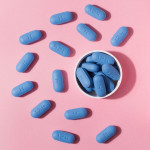One of the most commonly prescribed HIV medications, Viread (tenofovir) has a high safety profile but still causes kidney and bone mineral toxicities. A recent study found that Viread is tied to loss of kidney function in those with low body weight. And updated treatment guidelines from the HIV Medicine Association state that those with reduced kidney function should avoid Viread altogether.
These problems may diminish now that Gilead Sciences has applied to the U.S. Food and Drug Administration (FDA) for approval of the first single-pill combination tablet to contain an updated, safer version of Viread.
The current form of Viread is known as tenofovir disoproxil fumarate, or TDF; the new version is called tenofovir alafenamide, or TAF. Both meds are prodrugs, meaning they’re converted to their active forms inside the body. But while TDF is converted outside immune cells, TAF is converted inside them. Consequently, less TAF winds up in the bloodstream, where it can harm the kidneys and bones. Also, the necessary dose is just 10 percent of the amount of TDF, which further improves TAF’s toxicity profile.
The FDA application, filed in November, is for a tablet containing the same elements as Stribild—Vitekta (elvitegravir), Tybost (cobicistat), Emtriva (emtricitabine) and Viread—but with TAF instead of TDF.
Recent research into another single tablet regimen, which contains TAF along with Tybost–boosted Prezista (darunavir) and Emtriva, has found that the tablet is less toxic than a comparable multi-pill regimen that includes TDF, while boasting the same efficacy.
This Phase II trial randomly assigned 153 HIV-positive people who were new to treatment to take either regimen for 48 weeks. The regimens suppressed viral loads at almost identical rates. But those taking TAF had a 6.5-fold higher level of tenofovir in what are known as peripheral blood mononuclear cells when compared with those taking TDF, meaning that TAF targeted immune cells more effectively. Participants on the TAF regimen had a 91 percent lower level of tenofovir in the blood, leaving less of it to cause toxicities. Tests indicated that those taking TAF experienced less harm to kidneys when compared with those taking TDF. In addition, those taking the TAF–containing regimen had a significantly lower dip in bone mineral density at both the hip and the spine.
Anthony Mills, MD, an HIV specialist in West Hollywood who was the study’s lead author, anticipates that Gilead will move TAF into an increasing number of combination pills. He theorizes that TAF may not be ideal for use in Truvada (tenofovir/emtricitabine) as pre-exposure prophylaxis (PrEP), however, because TAF’s diminished plasma levels might actually make it less effective at preventing HIV infection.
Advertisement
Advertisement
Advertisement






Comments
Comments